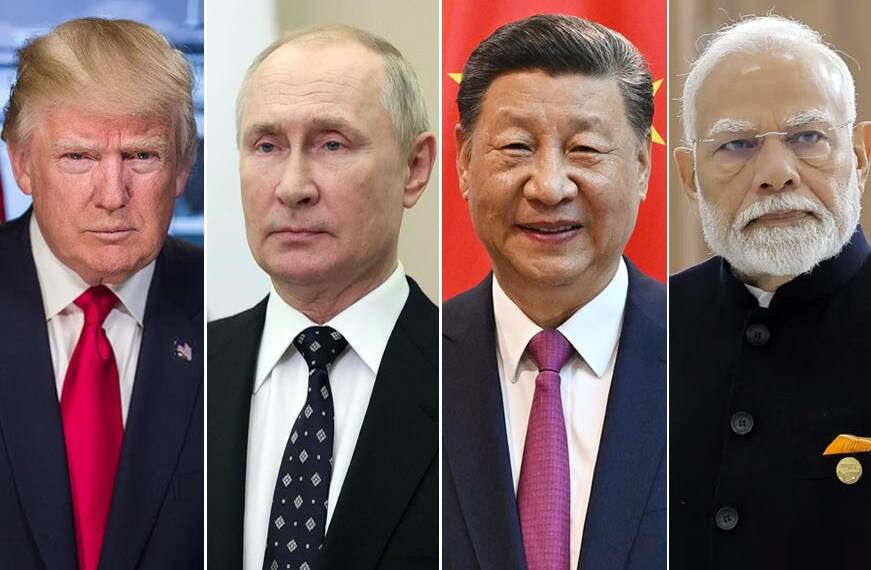In a sweeping policy proposal that could reshape global energy markets and international alliances, U.S. President Donald Trump is seriously considering imposing 500% tariffs on countries that continue to import Russian energy products such as oil, natural gas, and uranium.
The move, if enacted, would be one of the most aggressive economic measures yet taken against nations that maintain trade ties with Moscow, with Trump’s eyes clearly on deterring India and China from trading with Russia.
“I’m looking. It’s totally at my option. They pass it totally at my option, and to terminate totally at my option. And I’m looking at it very strongly,” said Trump on Tuesday to reporters during a Cabinet meeting. The American leader also expressed mounting frustration at Russian’s Putin for refusing to end the conflict with Ukraine. Trump recently directed the American Defence Department to send more defensive weapons to Ukraine.
The rationale behind the proposed tariffs is clear: to cripple the Kremlin’s energy revenues. Despite Western sanctions, Russia has continued to export billions of dollars’ worth of fossil fuels, especially to non-Western buyers.
India and China, the two largest consumers of Russian energy outside of Europe, are expected to be the primary targets of the measure. Both nations have maintained and even expanded their energy cooperation with Moscow, capitalizing on discounted prices amid Russia’s relative isolation from Western markets.
“This is economic warfare meant to stop a real war,” a senior Trump campaign advisor said. “Every dollar sent to Russia for oil or uranium is a bullet for Putin’s army. We’re done playing nice with countries that fund this brutality.”
Trump’s team believes that by punishing countries for trading with Russia—rather than simply sanctioning Russia directly—the United States could apply secondary pressure that forces key global players to rethink their strategic partnerships.
Global Response
The proposal has already sparked early warnings from economic analysts, foreign diplomats, and trade experts who fear that such a unilateral measure could destabilize international trade and create a new front in global economic warfare.
China’s Ministry of Commerce has issued a preliminary statement condemning any “extraterritorial tariffs” as violations of World Trade Organization (WTO) rules and an affront to national sovereignty. Analysts believe Beijing would retaliate with tariffs of its own or deepen its economic ties with Russia in defiance of U.S. pressure.
India, on the other hand has a good relationship with the west but has a deep historical relationship with Russia as well. Despite the continuous western pressure on Russia India has significantly increased imports of Russian crude and fertilizer, citing energy security and economic necessity. India has rejected outside pressures on its relationship with Moscow.
“India values strategic autonomy,” said a spokesperson for India’s Ministry of External Affairs. “Our energy partnerships reflect our national interests and should not be subject to third-party interference.”
India also highlighted Russia’s significant role as a major crude oil producer, with an output exceeding 9 million barrels daily. Explaining that a sudden removal of 9 million barrels from the global supply of approximately 97 million barrels would have necessitated an unfeasible worldwide consumption reduction of over 10%.
Such a disruption would have resulted in oil prices escalating beyond $120-130 per barrel, as consumers worldwide would have competed for limited supplies, “Imagine the chaos if this oil, amounting to about 10% of the global oil supply of around 97 million, vanished from the market,” Indian oil Minister Hardeep Singh Puri said.
“From India’s perspective, access to discounted Russian oil was not just a financial decision, but it was a strategic stabilizer for the global economy. If Russian oil were completely removed from the market and India had to buy its oil from elsewhere, it would have pushed up global oil prices, hurting most economies.” Puri said.
Implications of this move
Imposing a 500% tariff raises serious questions about legal feasibility and economic consequences. While the U.S. President has wide latitude on trade matters under emergency powers or national security justifications, such a steep and politically targeted tariff could face challenges in domestic courts and from international trade bodies.
Moreover, there are concerns about blowback on U.S. consumers and businesses. If major economies retaliate or if energy prices spike due to global market disruptions, Americans could face higher prices at the pump, increased costs of goods, and strained supply chains.
“This is not a scalpel; it’s a sledgehammer,” said Fiona Gall, an international trade specialist at Georgetown University. “While the goal of squeezing Russia is understandable, this could fracture key alliances and cause more harm than good in the short term.”
Trump’s latest move is especially notable because it marks a significant shift in tone and tactics. During his first term, Trump often criticized NATO, questioned traditional alliances, and avoided deep involvement in foreign conflicts. Now, he appears to be embracing a more assertive, punitive economic approach.
Some critics suggest this is less about Ukraine and more about reasserting American dominance in global trade. Others see it as a calculated strategy to rally domestic support by portraying Trump as tough on China, Russia, and India asserting his global relevance.
“Tariffs were Trump’s go-to tool in the past, but this is on a different scale,” said Dr. Laura Ramirez, senior fellow at the Council on Foreign Relations. “It’s no longer about balancing trade deficits—it’s about using the U.S. economy as a geopolitical weapon.”
While the bill has yet to be introduced in Congress, Trump allies in the House are already drafting language that would authorize these tariffs under the banner of “Global Energy Sanctions Enforcement.”
However, opposition is expected from both sides of the aisle. Moderate Republicans, business leaders, and progressive Democrats may resist what they see as a reckless economic provocation putting the US against the most powerful economies with huge populations and militaries, driving them away from the US and into their own bloc, perhaps even strengthening BRICS.








